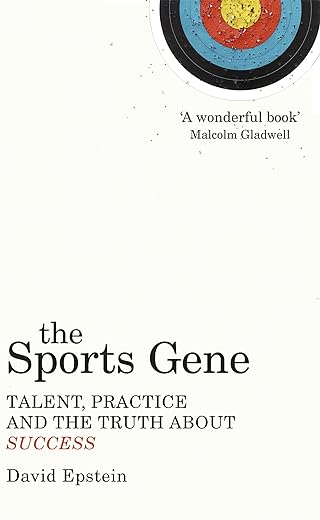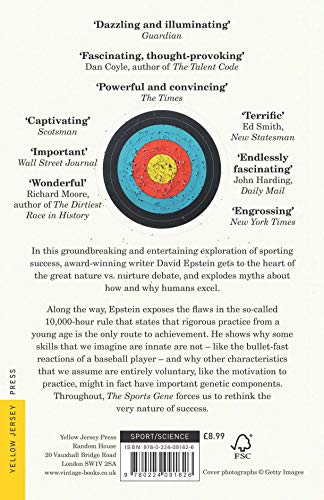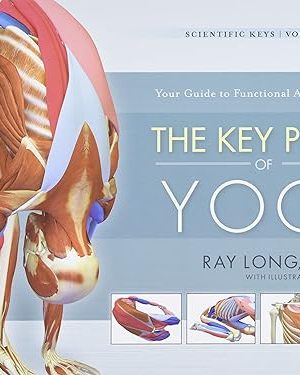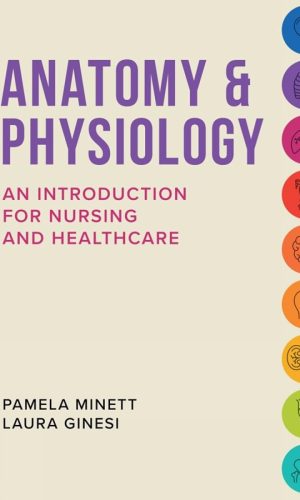The Sports Gene: Talent, Practice and the Truth About Success
£10.40£12.30 (-15%)
‘A wonderful book. Thoughtful…fascinating’ Malcolm Gladwell
Do you believe some people are born athletes?
Is sporting talent innate or something that can be achieved through endurance and practise?
In this ground-breaking and entertaining exploration of athletic success, award-winning writer David Epstein gets to the heart of the great nature vs. nurture debate, and explodes myths about how and why humans excel.
Along the way, Epstein:
– Exposes the flaws in the so-called 10,000-hour rule that states that rigorous practice from a young age is the only route to success.
– Shows why some skills that we imagine are innate are not – like the bullet-fast reactions of a baseball player.
– Uncovers why other characteristics that we assume are entirely voluntary, like the motivation to practice, might in fact have important genetic components.
Throughout, The Sports Gene forces us to rethink the very nature of success.
Read more
Additional information
| Publisher | Yellow Jersey (2 Jan. 2014) |
|---|---|
| Language | English |
| Paperback | 352 pages |
| ISBN-10 | 022409162X |
| ISBN-13 | 978-0224091626 |
| Dimensions | 12.9 x 2.1 x 19.8 cm |











by M. Hillmann
The 10,000 hour rule, which emphasises the importance of practice and training in achieving world class sporting success, was popularised by Malcolm Gladwell and Mathew Sayid in “Bounce”. In this meticulously researched book written in a compulsive story telling style, Epstein argues that the studies undertaken by K. Anders Ericsson – the so-called father of the 10,000 hour rule – do not address the existence of genetically based talent because their work begins with subjects of high achievement in music or sports. When most of humanity has already been screened out of a study before it begins, the study has nothing to say about the existence or non existence of innate talent.
Trelawny is a tiny parish in north west Jamaica. Sprinters and jumpers from Trelawny won 8 medals at the Beijing Olympics – more than entire countries won the in the entire Olympics. 32 marathon runners from the Kalenjin tribe in Kenya ran a sub 2hours10 minute marathon in one month in October 2011. Only 17 Americans in history have run sub 2.10. This is convincing evidence of the existence of the sports gene. Epstein looks, in some detail, at the genetic exceptions that these Jamaican and Kalenjin populations exhibit – the ACTN3 “sprint gene” prevalent among Jamaican people and the genetic make up of Kalenjin that gives them a particular linear build with narrow hips, and long , thin limbs.
But Epstein does not ignore the cultural and environmental factors. For example, the immense popularity of athletics and its passport to fame and fortune among impoverished west Indians, or kids running long distances to school at altitude in Kenya, and again the route out of poverty that athletic success can provide.
The book is full of fascinating investigations of specific sporting success including breeding huskies to win the Iditerod sledge race across Alaska. It also raises some serious concerns. Gene doping is already used in medicine to cure muscle-wasting diseases, such as myostatin inhibitors prescribed for muscular dystrophy. Myostatin-based treatments, amending the genetic expression of strength attributes, would be undetectable in a way that steroid doping is not. The gene doping era may already be here and we do not know it.
A compulsive, authoritative book that would appeal to more than just the sports junky.
by Mr E J Bonner
I bought this book having read it referenced in a number of articles relating to the nature/nurture argument and it was fascinating reading.
The conclusions from the book, that genes do have a major role in somebody’s attainment in a particular sport (though which genes exactly we do not know) is both a comfort for those who, however hard they try, will never make it in the NBA, and a source of humility for those who do in that, in part at least, they have their genetic inheritance to thank (i.e. total luck). There are fascinating chapters exploring the unusually high density of sprinters in Jamaica and long distance runners in Kenya as well as a de-bunking of the 10,000 hour rule for expert performance.
The book is written with humour and clarity, Epstein combining a scientist’s methodology and a sportsman’s passion to this book whose implication go beyond sport.
by Steve
A good read, it’s almost the opposite of Matthew Syed’s “Bounce” which explores the notion that motor skills are entirely the result of practice.
This book essentially goes the other way in saying that sporting ability (and skill development) is highly dependent on genes.
Realistically the answer is probably somewhere between the two and that while genes are a huge influence, so is the environment you live in.
by Rugby Coach
Good book, however, Epstien overdid the storytelling which became quite frustrating as the book progressed. Epstein’s writing style is very readable but he lost the balance in the latter stages and he took too long to make his points, many of his points were to often repeated. Having said that i would buy his follow up to this “Range”.
by Ryan Craig
Starts of good but tails off and becomes quite boring. Very research heavy
by Tim Walker
If you’ve watched David’s TED talk (as I had), then you probably have a fair idea of what this book will be about – suffice it to say, I was not disappointed, the book was very interesting and a nice insight into the many unusual ways that natural/genetic talents influence sport today.
As a fan of cycling, one must concede that performance enhancing drugs have altered the landscape of competition, and it is hard to know how far this has distorted the fields and results – although this question isn’t ignored (particularly with respect to female competitors) it would be an improvement to the book if somehow it could have peered back behind that curtain, although I appreciate that this is a big task given the obvious secrecy involved!
by Margaret Gough
Thumbs up! Great read and very interesting. Might be less so if not off a sporting nature! Give it a go!
by Jon.M
In short, we all know that basketball rewards tall athletes, gymnasts are smaller, marathon runners look a certain way etc…
In a world where people insist “Nothing is impossible” it’s refreshing to discuss (and acknowledge) the ingrained qualities which actually contribute to becoming elite in sport.
Fascinating insight which is rooted in science & fact, not hyperbole and speculation.